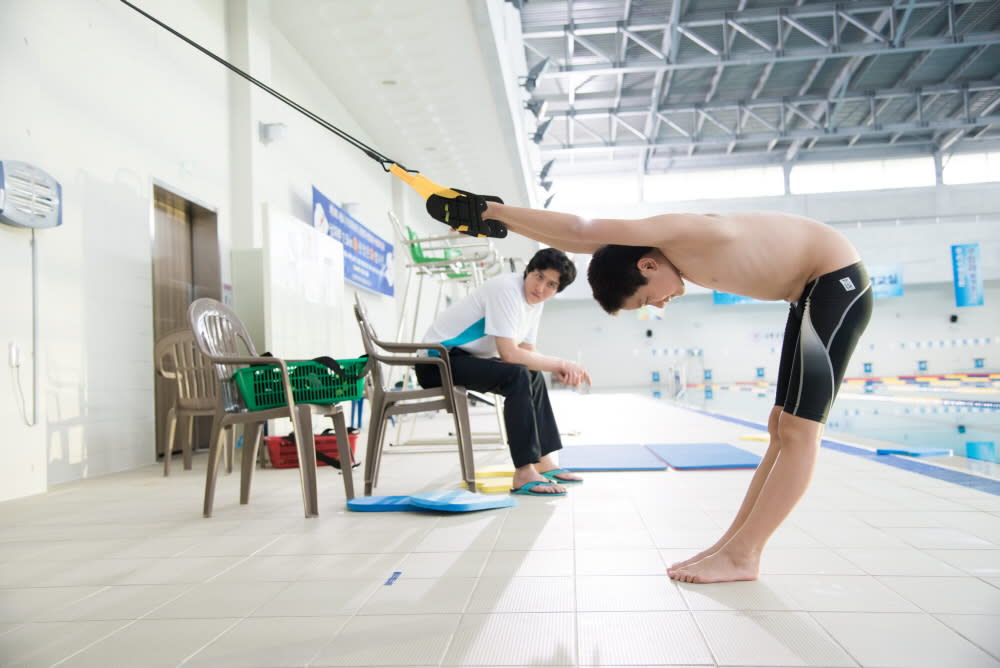Busan Film Review: ‘4th Place’

Fans of “Whiplash” will recognize the physical and psychological bruising a young swimmer receives from his coach and mother in order to win a medal in “4th Place,” South Korean helmer Jung Ji-woo’s poetic and engrossing drama condemning the underlying sadism and psychosis of a competitive educational culture, which destroys children’s talents by denying them their right to do something just for fun. (It’s no coincidence that Jung’s co-producer is the National Human Rights Commission of Korea.) The agony on display may not be jolly family entertainment, but offers such burning relevance to Asia’s performance-driven culture that one hopes it obtains limited theatrical and wider small-screen releases there.
A veteran whose 1999 drama, “Happy End” (starring Jeon Do-yeon in a breakthrough role), spun a classic amour fou of the early Korean wave, Jung recently made a comeback in 2012 with the Lolita drama “Eungyo,” which made Kim Go-eun the industry’s “it” girl. “4th Place” is less self-consciously artsy than that film, and as a result, its attention to the central characters’ emotional arcs is lucid and unwavering. The screenplay, co-written by Jung and Kim Min-ah is well structured, though an open ending might have been more thought-provoking.
A 15-minute black-and-white prologue depicts the media frenzy over high flyers at international sports championships, trumpeting their efforts as though fulfilling some sort of national duty. Enter bad-boy swimming athlete Kim Gwang-su (Jung Ga-ram), whose hard drinking and serial gambling makes one wonder how he could be an Asian Games record breaker and Korea’s Olympic hopeful. In the run-up to an international match, Gwang-su misses his training for days. As punishment, he is so severely thwacked by his coach that he snaps, and one can see why he tried to find refuge in booze and poker.
Sixteen years later (now played by Park Hae-jun, “Hwayi”), Gwang-su is a washed-up coach at the local aquatic center, but one woman (Lee Hang-na) believes he’s the miracle worker who can help her son Jin-ho (Yoo Jae-sang) break his curse of always coming in fourth place at junior intercollegiate matches. What at first appears to be a carrot-and-stick routine to help the boy shape up quickly descends into a nightmarish routine of physical strain, criminally brutal beatings, verbal assaults and, most egregious of all, continuous, mind-warping reminders that it’s all for Jin-ho’s own good.
In popular Korean sports films like “Lifting King Kong” or “Forever the Moment,” coaches who were onetime champs get a shot at redemption by grooming younger guns for glory. But “4th Place” subverts such feel-good formulas and their “no pain, no gain” philosophy, instead highlighting how Gwang-su takes out his own frustrations on Jin-ho and repeats the same cycle of violence and bullying. The tragedy is, it’s not out of personal spite, but simply because he doesn’t know any alternative, being trained as he was.
Even more disturbing is the complicity of Jin-ho’s mom in his abuse. In an unnerving scene, Jin-ho’s younger brother, Ki-ho (Suh Hwan-hee), alerts her that the swimmer has been beaten black and blue, but she pretends not to hear, only sneaking in to check her son’s bruises while he’s asleep. Then, she does absolutely nothing about it. Even when her husband, Young-hoon (Choi Moo-sung), discovers Jin-ho’s mistreatment and hits the roof, she remains unrepentant, asserting: “I’m more scared of Jin-ho placing fourth than getting hit.” It’s as if she has nothing to live for except to push her children around on the pretext of preparing them for the rat race.
Lee is a juggernaut onscreen, her expressive body language suggesting mental instability, as when she watches Jin-ho race from the spectators’ stand, arms flailing and eyes flaming, as if she’s in the throes of an epileptic fit or demonic possession. In one scene, she barks so loudly at Ki-ho during a private English lesson that even his tutor cowers under her nagging.
The impassioned yet unforced performances from the rest of the cast yield riveting, emotionally charged scenes without escalating into melodrama. Yoo, scouted from a school swimming team, is a natural at conveying his complex reactions of fear, self-doubt and internalized aggression. Every time Jin-ho’s mom drops him off for his training, his face and frail frame makes one realize how dangerously helpless tykes can be against adult whims.
Park, who reportedly modeled his movements and tone of voice on those of actual swimming instructors, sometimes goes overboard with his maniacal outbursts, but convincingly carries over traits from the younger Gwang-su. Offering a laid-back, reasonable counterpart to Lee’s high-strung rantings, Choi serves as the film’s sole comforting presence. It’s especially saddening that Young-hoon’s wish to let his son enjoy swimming as a hobby sounds like a voice in the wilderness.
Tech credits are aces, with extra kudos to the widescreen underwater lensing, expertly lit to make the pool look coldly uninviting one moment, magically dreamlike the next. Cho Hyung-rae’s cinematography is artfully gritty in the black-and-white prologue, but afterward full of sunlight and color. Excerpts of Handel and Brahms in Jeong Hyun-soo’s score offers some serene respite from the intense drama.
Get more from Variety and Variety411: Follow us on Twitter, Facebook, Newsletter
